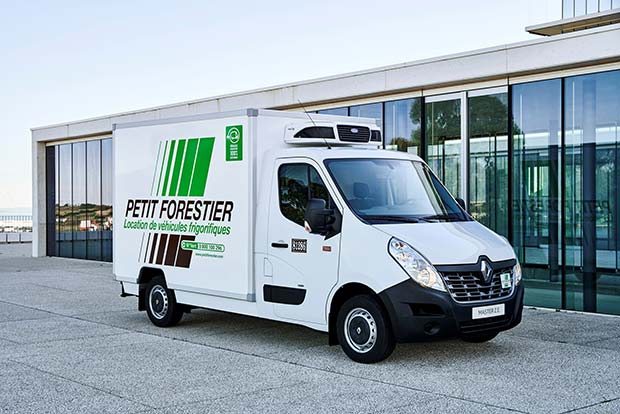The switch to electromobility within heavy vans and trucks has started. We take a look at how heavy duty electric commercial vehicles are changing the automotive landscape, and how we plan our cities and infrastructure for an electric future.

Electric vehicles are nothing new. The first cars with an electric motor were presented at the end of the 19th Century, and very nearly stole the market, but limitations on battery range and size saw the combustion engine overtake.
By the 2000s, tightening emissions regulations pushed manufacturers to revisit electric vehicles. Pressures from politicians, industry and the public demanding a zero-emissions alternative to the combustion engine has seen huge investments in battery technology that has improved range, power, energy and durability. For many urban applications, electric vehicles are finally becoming performance and price competitive with the latest diesel combustion engines, putting them right back in front of a new transport revolution: electromobility is the future. The three main type of client in this growth are through Early Adopters, Pushed Customers and Key Account Operators.
Leading the charge is Renault Trucks, part of the Volvo Group. A pioneer in this field, it has put electromobility at the heart of its sustainable urban transport strategy. Over the past 10 years, Renault Trucks has been working with commercial operators to prove the operational capacity and commercial viability of a range of hybrid and fully electric vehicle technologies across several countries. In the UK, Renault Trucks’ first hands-on experience with electric vehicles was during the London Olympics in 2012, providing a hybrid electric 26t vehicle which delivered Coca-Cola to sites during the Games – it didn’t miss a beat then, or in a further four years’ operating in the capital.
Today, its second generation of fully electric vehicles available from 3.1 to 26 tonnes, with proven performance offer a range of solutions for urban operations including last mile logistics, refrigerated chilled distribution, street lighting MEWPs, urban passenger transportation and refuse collection. All offer zero tailpipe emissions of CO2 and other local pollutants normally associated with the traditional combustion engine. The all-electric Renault Trucks Master Z.E. comes in six variants – four panel vans and two platform cabs – to meet the varied requirements of professionals working in urban environments, covering Logistics, Utilities and Passenger operations. As well as payloads of up to 1,128kg and a realworld operating range of at least 120kms (depending on topography, weight, driving style and season), the Master Z.E. offers loading volumes up to 24m3 and offers no cargo space intrusion as the batteries are mounted under floor. A fully automatic gearbox makes urban distribution a much easier operation for drivers, minimising driving stress and effort. Importantly, Renault Trucks’ investment over the last ten years means it has the experts in its dealer network who are ready to help customers transition seamlessly to electromobility.
 However, getting the vehicles right and customers on-board is just one part of the story. If we are to increase adoption rates of electric vehicles in the UK and meet the government’s ‘Road to Zero’ targets we need a strategic roadmap that clarifies the key issues of urban planning, establishing a national charging infrastructure and investing in our power networks. With 3 tiers of regulation coming in from the EU, Government and now the new city mayors, gaining a uniformed approach across the whole of the UK and Ireland is a huge challenge and there’s a long way to go. A charging network is critical to the success of electric vehicles; the Government has committed £440m to delivering charging infrastructure but if we are to increase the number of vehicle charging points from just 16,500 today to 100,000 by 2020, we need a joined-up approach. Government and industry must work together to agree the way forward for a planned, sustainable, all-electric future that will benefit our businesses, cities and communities.
However, getting the vehicles right and customers on-board is just one part of the story. If we are to increase adoption rates of electric vehicles in the UK and meet the government’s ‘Road to Zero’ targets we need a strategic roadmap that clarifies the key issues of urban planning, establishing a national charging infrastructure and investing in our power networks. With 3 tiers of regulation coming in from the EU, Government and now the new city mayors, gaining a uniformed approach across the whole of the UK and Ireland is a huge challenge and there’s a long way to go. A charging network is critical to the success of electric vehicles; the Government has committed £440m to delivering charging infrastructure but if we are to increase the number of vehicle charging points from just 16,500 today to 100,000 by 2020, we need a joined-up approach. Government and industry must work together to agree the way forward for a planned, sustainable, all-electric future that will benefit our businesses, cities and communities.
There is some evidence of this happening but it is small scale, however there are examples of planning permission being granted in inner cities on the basis that ultra clean vehicles are to be operated from that location. Some innovative thinking around using lamp posts as charging points in densely populated roads is another opportunity, or utilising stadium carparks during the week when they are largely empty.
More recently we have seen BP purchase Chargemaster, one of the largest infrastructure companies, with plans to install rapid chargers in BP fuel stations, the first time an international oil company has joined the electromobility revolution.
From Renault Trucks’ perspective, the introduction of their all electric Z.E. range signifies a serious intent to offer operators a truly workable zero emission solution, in terms of pollutants and noise, in line with environmental strategies.
Grahame Neagus, Head of LCV, Renault Trucks UK.
RENAULT TRUCKS




Comments are closed.